Blankets & Duvets
- New
- Mattresses
- Toppers
- Blankets & Duvets
- Pillows & Pillowcases
- Protectors, Covers, Sheets
- Headboard Cushions
- Kids Mattresses & Toppers
- Nursery
- Pregnancy
- Cushions
- Decorative Pillows, Poufs
- Rugs
- Wellness
- Pet Beds
- Outlanding & Camping
- Zero Waste Mission
- Bundles
- Sale
- Gift Card
- Product Samples
- Fabrics, Wool & Batting
- Nomad Heat Sleeping Bags
- Kitchen Textiles
13 Products
-
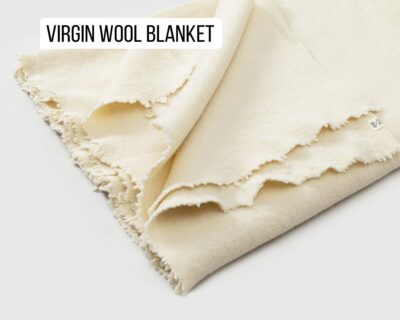
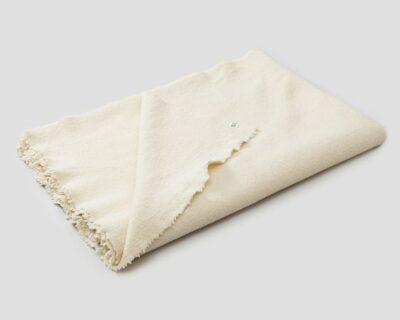 Prices from $144
Prices from $144Indulge in the ultimate luxury of pure natural fibers with this 100% virgin wool blanket. Perfect for adding coziness to your couch or bedroom, it’s the ideal companion for the evenings when you need to relax. Experience the unparalleled comfort of virgin wool free from chemicals, fire retardants, and dyes.
Regulates temperature unlike any other material to keep you cool in the summer and warm in the winter. Wicks away body moisture for sweat–free nights. Diminishes body odor. Completely chemical-free, with no off-gassing and zero VOCs. Hypoallergenic, suitable for people with chemical sensitivities, including MCS. Naturally dust mite and mildew-resistant, anti-microbial, anti-bacterial, and flame-resistant. 100% biodegradable using only sustainable renewable materials
MATERIAL: 100% Wool


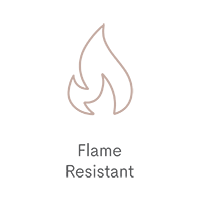

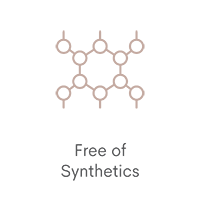
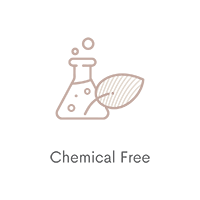


-

 Prices from $405
Prices from $405Experience the exquisite hug of wool and discover the unparalleled comfort of its lofty fibers. Enjoy the perfect temperature for a deep, restful, and dry sleep year-round. Stay cool in summer and warm in the winter. Wake up fresh and recharged. Choose between linen, cotton, and wool fabrics.
Completely chemical-free, with no off-gassing and zero VOCs. Hypoallergenic, suitable for people with chemical sensitivities, including MCS. Naturally dust mite and mildew-resistant, anti-microbial, anti-bacterial, and flame-resistant. 100% biodegradable using only sustainable renewable materials
Need help choosing from the options? Read our guide.
-

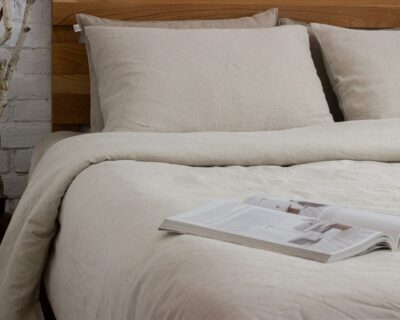 Prices from $390
Prices from $390All-natural, synthetic-free, and fully customizable. Combining handmade craftsmanship and luxurious comfort. Completely chemical-free, with no off-gassing and zero VOCs. Hypoallergenic, suitable for people with chemical sensitivities, including MCS.
100% biodegradable using only sustainable renewable materials







-
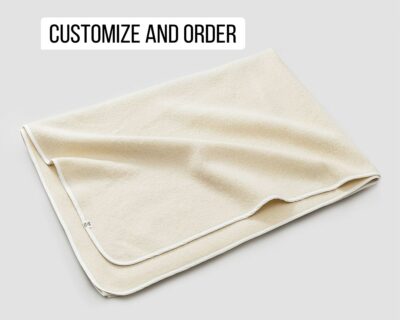
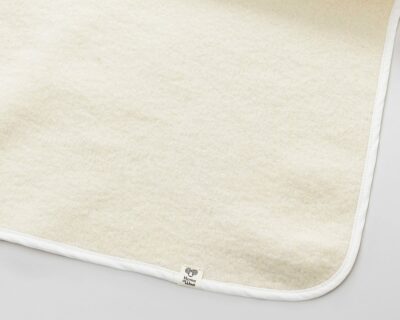 Prices from $99
Prices from $99Luxurious and soft, this all-natural blanket is made of 100% virgin wool.
Regulates temperature unlike any other material to keep you cool in the summer and warm in the winter. Wicks away body moisture for sweat–free nights. Diminishes body odor.
Completely chemical-free, with no off-gassing and zero VOCs. Hypoallergenic, suitable for people with chemical sensitivities, including MCS. Naturally dust mite and mildew-resistant, anti-microbial, anti-bacterial and flame-resistant.
100% biodegradable using only sustainable renewable materials

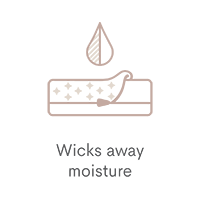







-

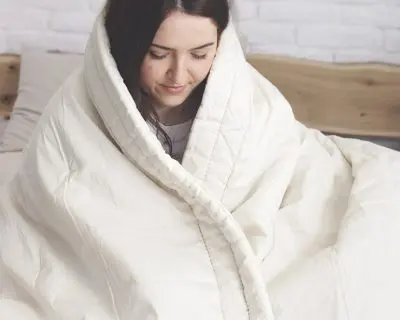 Prices from $270
Prices from $270Experience the exquisite hug of wool and discover the unparalleled comfort of its lofty fibers. Enjoy the perfect temperature for a deep, restful, and dry sleep year-round. Stay cool in summer and warm in the winter. Wake up fresh and recharged. Choose between linen, cotton, and wool fabrics.
Completely chemical-free, with no off-gassing and zero VOCs. Hypoallergenic, suitable for people with chemical sensitivities, including MCS. Naturally dust mite and mildew-resistant, anti-microbial, anti-bacterial, and flame-resistant. 100% biodegradable using only sustainable renewable materials
Need help choosing from the options? Read our guide.
[vc_tta_accordion c_icon="chevron" active_section="0" collapsible_all="true" style="flat"][vc_tta_section title="FEATURES" tab_id="1686045152192-3c2d12ca-94d4"][vc_column_text]- Hand quilted to secure the wool batting in place.
- Includes a free sample of the batting of your choice.
[/vc_column_text][/vc_tta_section][/vc_tta_accordion]
-

 Prices from $675
Prices from $675Put your mind and body at ease while traveling with the security of your personal sleep sack. This compact, lightweight sleep sack unfurls like a sleeping bag and easily slips into your suitcase when folded.
Use it when you travel or visit friends.
Wrap yourself in all-natural materials for a restful and comfortable night’s sleep.Completely chemical-free, with no off-gassing and zero VOCs. Hypoallergenic, suitable for people with chemical sensitivities, including MCS. Naturally dust mite and mildew-resistant, anti-microbial, anti-bacterial, and flame-resistant.
100% biodegradable using only sustainable renewable materials.
[vc_tta_accordion c_icon="chevron" active_section="0" collapsible_all="true" style="flat"][vc_tta_section title="FEATURES" tab_id="1685085579400-80126209-1f81"][vc_column_text]






- Integrated undersheet, quilted duvet, and pillowcase + optional removable pillow.
- Ties to secure when rolled up.
[/vc_column_text][/vc_tta_section][/vc_tta_accordion]
-
 US$18
US$18Regulates temperature unlike any other material to keep you cool in the summer and warm in the winter. Wicks away body moisture for sweat–free nights. Diminishes body odor.
Completely chemical-free, with no off-gassing and zero VOCs. Hypoallergenic, suitable for people with chemical sensitivities, including MCS. Naturally dust mite and mildew-resistant, anti-microbial, anti-bacterial, and flame-resistant.
100% biodegradable using only sustainable renewable materials.
SIZE: 16 x 16” (40 x 40 cm)
-
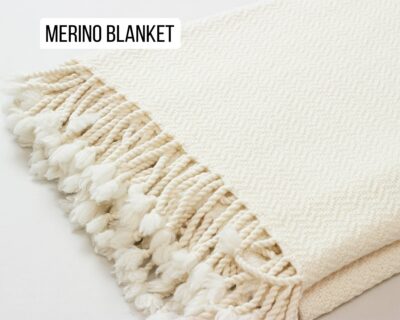
 US$288 – US$324
US$288 – US$324Luxurious with cloud-like softness, this all-natural throw blanket is made of 100% merino wool.
Regulates temperature unlike any other material to keep you cool in the summer and warm in the winter. Wicks away body moisture for sweat–free nights. Diminishes body odor. Completely chemical-free, with no off-gassing and zero VOCs. Hypoallergenic, suitable for people with chemical sensitivities, including MCS. Naturally dust mite and mildew-resistant, anti-microbial, anti-bacterial, and flame-resistant. 100% biodegradable using only sustainable renewable materials
SIZE: 59 x 79″ (150 cm x 200 cm)
MATERIAL: 100% Merino Wool (Oeko-Tex certified)
WEIGHT: 2.5 lb / 1.15 kg








-

 US$279
US$279Luxurious and soft, this all-natural newborn swaddle blanket is made of 100% virgin wool with organic cotton lining and is designed to make your baby feel hugged, safe, and touched.
Regulates temperature unlike any other material to keep you cool in the summer and warm in the winter. Wicks away body moisture for sweat–free nights.
Washable for easy maintenance. Safe and healthy – all-natural, synthetic-free, completely chemical-free, with no off-gassing and zero VOCs. Hypoallergenic, suitable for people with chemical sensitivities, including MCS. Handmade and fully customizable.
100% biodegradable using only sustainable renewable materials.
SIZE: 31.5 х 31.5″ (80 х 80 cm)








-
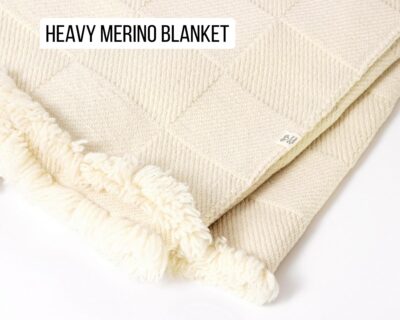
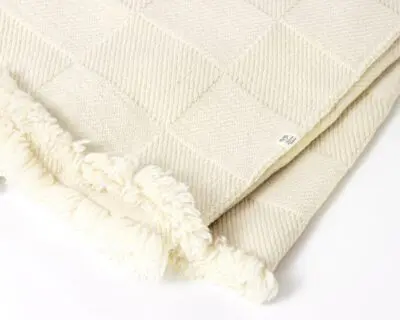 US$459 – US$540
US$459 – US$540Stay warm with this all-natural blanket made of 100% wool. Wool is an environmentally sustainable material and its pure fibers are naturally hypoallergenic, fire-resistant, water repellent, and mildew-resistant—creating an environment in your home that’s both safe and clean. This ultralight insulator regulates your temperature, so you can stay wrapped up comfortably in a chilly room.
SIZE: 77″ x 83″ (195 x 210 cm)
WEIGHT: 7.5 lbs / 3.4 kg







-
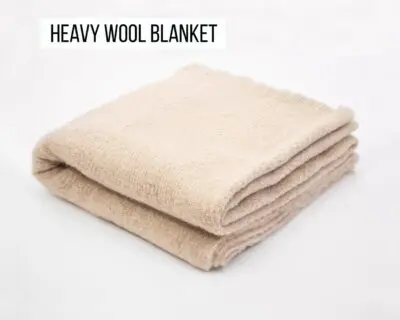
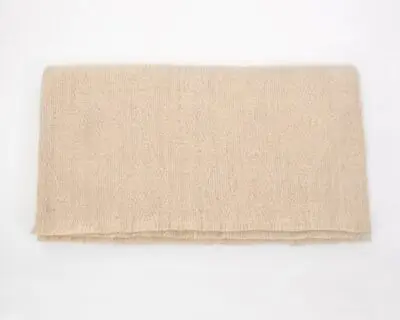 US$162 – US$330
US$162 – US$330Stay warm with this all-natural blanket made of 100% wool. Wool is an environmentally sustainable material and its pure fibers are naturally hypoallergenic, fire-resistant, water repellent, and mildew resistant—creating an environment in your home that’s both safe and clean. This ultralight insulator regulates your temperature, so you can stay wrapped up comfortably in a chilly room.
SIZE OPTIONS:
- Small – 43 x 63″ (110 х 160 cm), 2.9 lbs (1.3 kg)
- Medium – 59 x 83″ (150 x 210 cm), 5.7 lbs (2.6 kg)
- Large – 79 x 87″ (200 x 220 cm), 7.3 lbs (3.3 kg)








-

 US$263 – US$330
US$263 – US$330Stay warm with this all-natural blanket made of 100% wool. Wool is an environmentally sustainable material and its pure fibers are naturally hypoallergenic, fire-resistant, water-repellent, and mildew-resistant—creating an environment in your home that’s both safe and clean. This ultralight insulator regulates your temperature, so you can stay wrapped up comfortably in a chilly room.
SIZE: 59 x 79″ (150 x 200 cm)
WEIGHT: 5 lbs / 2.3 kg











